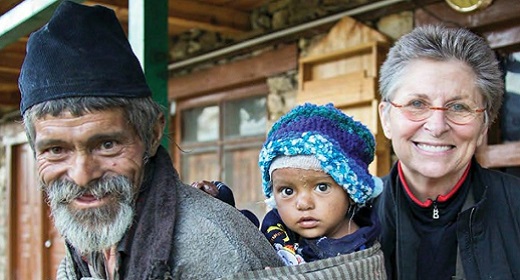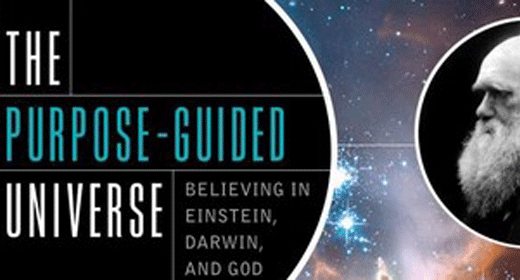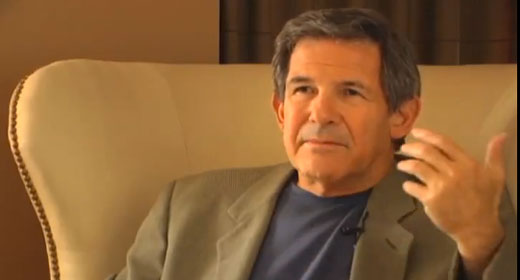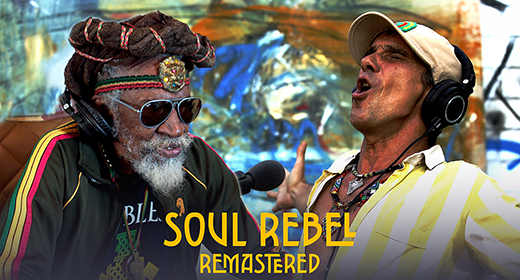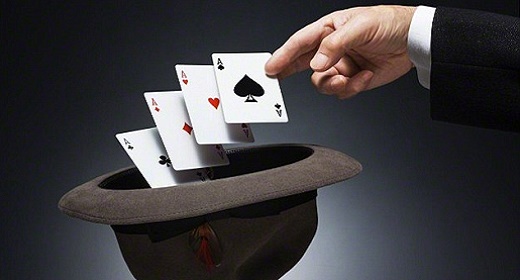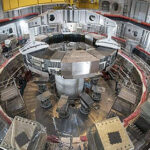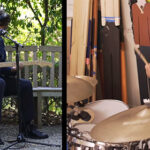Donna Quesada: Something else you said that really struck me, and I believe it was in the context of a conversation you had with Oprah…
You said “the universe doesn’t judge in terms of good or bad, but rather with regard to limitations or opportunity.” And I really loved that. It spoke to me, and I’m wondering if you could speak to that a little bit. The universe doesn’t judge in terms of good or bad. And I love it because we’ve all been ingrained with that idea of good versus bad, but it’s not really about that, is it?
Gary Zukav: No, it’s not. And you can make that a sentence that’s even shorter. The universe doesn’t judge, period. You are in motion. You are, from my perspective, a soul, a part of a soul that is incarnate temporarily in the Earth School. That is what I mean when I say you are in motion. That motion is your life, and it will take you always to experiences that demand a choice, the choice of love or the choice of fear. This is always your choice, your only choice, and only you can make it. It doesn’t matter.
Well, let me put it this way. Whatever you choose, whether it creates loving consequences and constructive consequences or painful consequences and destructive consequences, you will learn from it. There’s no right and there’s no wrong. There’s your choice and the consequence it creates, and there’s learning in both cases. The choice is… how do you want to learn? Through fear and doubt or through love and trust?
What experiences do you want in your life? Joy? Meaning… purpose. Or emptiness, pain, despair? These are your choices. If you don’t like the consequences you’re creating, choose differently. Creating authentic power is how to do that. That’s what the book, The Seat of the Soul, is about. That’s what the courses and the events that my spiritual partner, Linda Francis, and I have created and are creating with The Seat of the Soul support team.
DONNA: You talk about trust, and it’s so difficult for a lot of people to trust, and I want to connect the dots with something else you said in The Seat of the Soul, that our species has lost the quality of humility. I’m not sure if you said it exactly like that, that our species is no longer humble. And I think that these two ideas are related because to trust, I have to let go of my own agenda to a certain extent. And that requires humility. Is that correct?
Gary: Yes.
DONNA: And if so, why have we lost this?
Gary: And there is more. What do you trust? What are you trusting when you say, “I trust?”
DONNA: What I trust, when I’m in a place of trust… I’m trusting that things are as they should be.
Gary: What does that mean? Who determines what they should be?
DONNA: I’m not sure if I put a who on there. I think that we could say God. I sometimes say God, but I don’t think I necessarily need to tack on the notion of God. It’s just the way it is.
Gary: Let me offer something that may be okay. What you’re expressing… I hope clearly. From my perspective, all of your experiences are what they need to be, given the wisdom of the choices that you’ve made. And you have created those experiences through your choices. You can trust that. I would say that would be trusting the universe. And it’s not trusting that you’re doing the right thing. And hopefully, we’ll be able to avoid the wrong thing. It is trusting that whatever you experience in your life… is there for your spiritual growth.
Instead of trying to control the world, which means, if you think the world is creating your experiences, controling your life, you’re not responsible for that. You are responsible for your choices. Whatever comes to you will require a choice. And that’s what you’re responsible for. Not doing it right or wrong, you will make a choice. You are a powerful and creative, compassionate and loving spirit. You choose. That is your essence. It’s more than your superpower.
It’s who you are. You choose. And as you choose, you create. What will you create? That is for you to choose. That’s what I meant when I talked about responsibility, the recognition of responsibility, of your responsibility for your choices of love or fear. And as you make that choice, you create your experience. You create your experience of the world with your choices.
DONNA: It doesn’t leave any room for regret.
Gary: Regret is a frightened part of your personality. It’s an experience of fear. It serves no purpose. Challenge it the way you do others, with emotional awareness and responsible choice.
DONNA: Take the lesson and move on, in other words.
Gary: There’s no place to move on to. You are now all that you are. Where can you move to? Experience and learn from that experience by either responding to it with love or reacting to it with fear. And in the first case, you create blissful consequences, experiences. And in the second case, you create painful experiences and consequences.
DONNA: In preparing for this interview, I was reading about you and your days in San Francisco. And I was wondering if you would share with us what brought you to write… to start your journey as a writer, in sharing these wisdom teachings with us.
Gary: Well, my journey, like yours, has been complex and deep and rich, but it’s not necessarily as a writer. It’s one of the things that I’ve encountered… an aptitude that I have and that I’ve used. The first book that I wrote was about quantum physics.
DONNA: The Dancing Wu Li Masters.
Gary: Yes, I didn’t consider it a wisdom book at the time, but looking back, I knew there was wisdom in it. It’s not about wisdom, it’s about quantum physics, but it is about quantum physics because I knew in those days, even in those days, that quantum physics challenged the hegemony, the power of the intellect. It brought those people involved in it right up to the limits of the intellect.
Let me give you an example, so that people who don’t know what quantum physics is or aren’t able to follow… All the world of physics was thrown into turmoil around 1905 when a fellow named Max Planck did a certain type of experiment. It’s pretty simple. He had a box and there was no way for light to get into it, and he heated the box until it glowed red. It’s called Planck’s Black Box Experiment. It’s not very complicated.
And because of what he observed and thought about, he hypothesized that energy isn’t released from anything smoothly. It comes out in chunks, like a quantity of something, and he called it a quantum. From those discoveries, over 27 years, or until 1927, physicists were trying to figure out what is going on, and they developed a mathematical theory, which means numbers, that can predict not events, but probabilities.
If you create or prepare an experiment in a certain way and measure it in a certain way, you can calculate with their theory, called The Wave Theory, what the probabilities are of the outcome of that experiment. I’m gonna make this really simple, but not any less accurate. Suppose you prepare the experiment such that an electron has to go through one of three slits in a piece of cardboard.
If you prepare this experiment with the precision that’s necessary, and using the wave function, the quantum formula, you can predict… well, there’s a 40% probability that it’ll go through that slit, and a 5% probability that it’ll go through this slit, and what’s the rest? A 65% probability… It’s gonna go through the third slit. That’s quantum theory. It works. It works in every domain, from the very large to the very small. And in the process of developing… and by the way, this wave theory has elements in it to make it work that are not connected to observable reality.
Therefore, it’s called an abstract theory. And what they decided was that… by “they,” I’m talking about Niels Bohr, Werner Heisenberg, Erwin Schrodinger… they all came to this conclusion. You can’t experience or understand nature, with a capital N, which is their word for the universe in those days, I think. When you observe it, you interfere with it. You’ll never know the world or nature the way it really is. That’s what I mean when I say that the quantum theory challenged the limits of the intellect.
DONNA: No such thing as an impartial, objective observer, or certainty for that matter.
Gary: Well, the observer can be impartial in the way that he sets up the experiment, but she’s not impartial in choosing the experiment. There’s one experiment called a… well, I don’t wanna go into the history of quantum theory, but essentially the wave-particle duality is just that. There are two experiments that have been done, one in the 1800s by Thomas Young and one in 1905 or so by Albert Einstein.
And one of them proved… I don’t mean “hypothesize,” I don’t mean “theorize”… it proved that light is wave-like. There’s no other way to understand the results of this simple experiment if light is not a wave. And Albert Einstein had a thought experiment and there’s no way to understand it and it always is demonstrable. There’s no way to understand it unless light is made of little particles like machine-gun bullets called photons. This is the wave-particle duality. And there are several ways to interpret this abstract mathematical formula called the formalism of quantum theory.
DONNA: What is your favorite way to interpret it?
Gary: My favorite is the way that most theoretical physicists adopted in 1927 and still use today. It’s called the Copenhagen Interpretation of the quantum theory. But let’s return now to responsibility. You said an observer can’t be impartial. But whether or not nature appears as wave-like or particle-like to the experimenter depends upon the experiment that she chooses to do.
The wave-like experiment or the particle-like experiment… So she’s not impartial; she’s already made a decision. Everything that you do in the Earth School requires a decision, every experience, and you will make it. It’s not a, would you like to, it’s an if. Look at your life and you’ll see that that is the case. And that decision is a choice of love or of fear. That is the fundamental duality in the Earth School. It’s analogous to the wave-particle duality in quantum physics. Love and fear.
If something is a wave, it can’t be a particle because a wave is spread out over space. And if something is a particle, it can’t be a wave because a particle is confined to a point. One excludes the other. They’re mutually exclusive. Wherever there is love, there is not fear. Fear is not possible. Wherever there is fear, there is not love. Love is impossible when you are in fear. You choose.
DONNA: What is love?
Gary: What is love? The loving parts of your personality you experience as gratitude, appreciation, caring, contentment, patience, all of the universe. When you are experiencing any of those, you are aligned with the energy of your soul. Another way of describing authentic power is the alignment of your personality with your soul.
When you experience these things, and you do experience them when you create authentic power, when you are in a frightened part of your personality and use your will to put your attention into a loving part of your personality, one of these experiences… and choose to act from that loving part of your personality while you are experiencing the painful physical sensations and judgmental thoughts of the frightened part of your personality… that is the moment of creating authentic power.
DONNA: If I choose love, am I necessarily in alignment with my soul? Is there a necessary correlation there?
Gary: If you want to experience love, it is.
DONNA: Because how would one know if we’re living in alignment between our personality and our soul? What is the sign that tells me I have chosen in a way that my soul feels good about? Because sometimes feelings are deceptive.
Gary: Your soul intends harmony, cooperation, sharing, and reverence for life. And when you choose those things, you’re choosing to act from a loving part of your personality. Your experiences are never deceptive. Well, that’s not correct. Let me put it this way. The entire realm of fear is an illusion. It doesn’t exist. That’s why following it doesn’t lead to fulfillment or wholeness. If it did, John Lennon would have written a song, All You Need is Fear. That’s absurd. Everyone can see that.
DONNA: So I guess my own question is that feeling of contentment and rightness in the universe that I have chosen from love, and I am therefore acting in alignment with my soul…
Gary: Yes. As long as you’re not saying “rightness” with a sense of judgment as opposed to wrongness.
Read and Watch Pt 1 Here: Awaken Interviews Gary Zukav Pt 1 – To Change the World, You Need to Change Yourself
Read and Watch Pt 3 Here: Awaken Interviews Gary Zukav Pt 3 – The Three Tools to Creating Authentic Power
Read and Watch Pt 4 Here: Awaken Interviews Gary Zukav Pt 4 – Ask Yourself, Am I Choosing From Love or from Fear?





